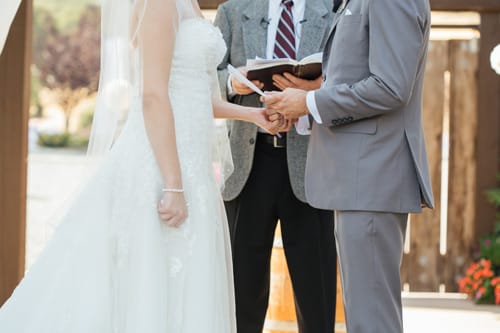Having a friend or family member officiate your wedding can make the event extra special, and it’s no wonder why more and more couples are choosing to go this route. Think about it: a judge or a hired officiant might do a fine job, but they don’t really know you. They don’t understand your individual personalities or your unique story – not in the profound way a friend or family member does. Plus, having a friendly face up there with you can do wonders for calming any residual nerves.

Thanks to the Universal Life Church, having a loved one conduct the ceremony has never been easier. Do keep in mind, however, that this is a big commitment and not everyone is cut out for the role of wedding officiant. Below, we’ll discuss some tips for how to have a friend officiate your wedding and how to choose the right person for the job. How to Choose the Right Wedding Officiant
- Ask someone who is articulate and comfortable speaking in front of an audience. This is first and foremost a public speaking event, so keep that in mind when selecting someone to fill the role. For example, although you and your brother might be really close, if he suffers from stage fright then he’s probably not the best choice.
- Make sure they understand the gravity of the ceremony. You’re not asking this person to give you a toast; they’ll be in charge of emceeing the most important day of your life. Avoid someone who may try to insert an unwelcome brand of humor into the script or make the ceremony more about themselves than about you and your partner
- Give the person plenty of time to prepare. A wedding script doesn’t come together in one day, so be sure to give your officiant ample opportunity to practice and prepare. Work with them to formulate a script that aligns with your vision and features all the ceremony elements you want included. Another reason to give advance warning: your friend or family member will need time to get ordained and have any necessary items shipped to them.
- Don’t be offended if they say no. Not everyone was born to be an officiant, so if the person declines your request, respect their decision. Maybe your friend is afraid of disappointing you or doesn’t have the confidence to stand up in front of a crowd. Whatever the case may be, you’re probably better off asking someone else instead of trying to squeeze a square peg into a round hole.
Getting Ordained
Once you’ve selected the perfect person to officiate and they’ve agreed to take on this important duty, the next step is to help them get ordained. This process is completely free and can be done right here on our website. To get started, have your officiant fill out an ordination application form. The ULC also has a step-by-step guide on becoming ordained depending on your vicinity that they can read up on if they wish.
Keep in mind that depending on where the wedding will take place, they might also be required to show official documentation proving they are legally ordained. We advise consulting our Wedding Laws Map to see what is required in your area. Additionally, we offer detailed information on the process of performing a wedding as a resource.
Before the Ceremony
When you’re having a friend officiate your wedding, make time for a few practice run-throughs before the dress rehearsal. By getting some more reps in, you’ll be able to work out any issues with timing or staging early on – giving your officiant extra time to focus on other aspects of the ceremony.
Don’t forget to discuss other important day-of details, too, such as what to wear. Having an officiant that’s noticeably underdressed or overdressed won’t be ideal for those final ceremony photos. While all eyes might be on the bride and groom, the officiant is center stage as well.
Finally, there’s the issue of compensation to discuss. Hiring a professional officiant can be expensive (another reason often cited for having a friend officiate), but just because you know the officiant personally doesn’t mean you should assume they’ll do the job entirely for free. Make sure to have that discussion early on to avoid any awkward misunderstandings. Even if you and the officiant agree that no payment is required, it’s a good idea to have a gift for them to say thanks.
Use the ULC as a Resource

There are a lot of moving parts involved in performing a wedding ceremony. Officiants have to research local laws and registration requirements, come up with a script, and understand the ins and outs of a marriage license. We understand that this can be a bit overwhelming, especially for first-time officiants. That’s why we offer a helping hand by providing useful tools, explainer pages, and even wedding supplies to ensure all our ministers are well-prepared when the big moment finally arrives. Regardless of who you choose to perform your wedding, know they’ll have a wealth of resources available to them. While your officiant is studying up, you can focus on the bigger task at hand: making your ceremony everything you've always wanted.

